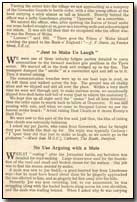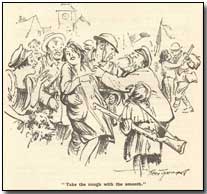Memoirs & Diaries - The Best 500 Cockney War Stories - No Use Arguing with a Mule and Other Stories
 Published in London
in 1921, The Best 500 Cockney War Stories
comprised, in the words of its newspaper publisher (The London Evening
News) "a remembering and retelling of those war days when laughter
sometimes saved men's reason".
Published in London
in 1921, The Best 500 Cockney War Stories
comprised, in the words of its newspaper publisher (The London Evening
News) "a remembering and retelling of those war days when laughter
sometimes saved men's reason".
The collection of short memoirs, some 500 in total, is divided into five categories - Action, Lull, Hospital, High Seas and Here and There. This page contains five stories from Lull, led by No Use Arguing with a Mule.
Other sections within the collection can be accessed using the sidebar to the right.
No Use Arguing with a Mule
Whilst "resting" after the Jerusalem battle, my battalion was detailed for road-making.
Large stones were used for the foundation of the road and small and broken stones for the surface. Our job was to find the stones, assisted by mules.
A mule was new to Joe Smith - a great-hearted boy from Limehouse way - but he must have heard about them for he gingerly approached the one allotted to him, and as gingerly led him away into the hills.
Presently Joe was seen returning, but, to our amazement, he was struggling along with the loaded baskets slung across his own shoulders, and the mule was trailing behind. When I asked why he was carrying the load, he replied: "Well, I was loading 'im up wiv the stones, but he cut up rusty, so to save a lot of argument, I reckoned as 'ow I'd better carry the darned stones meself."
A . C. Wood, 56 Glasslyn Road, N.8
Kissing Time
It was towards the end of '18, and we had got old Jerry well on the run. We had reached a village near Lille, which had been in German occupation, and the inhabitants were surging round us.
A corporal was having the time of his life, being kissed on both cheeks by the girls, but when it came to a bewhiskered French papa's turn the corporal hesitated.
"Nah, then, corporal," shouted one of our boys, "be sporty! Take the rough with the smooth!"
G. H. Harris (late C.S.M., 8th London Regt.), 65 Nelson Road, South Chingford, E.4
"Playin' Soldiers"
We were in the Cambrai Salient, in support in the old Hindenburg Line. Close to us was a road where there were a ration dump and every other sort of dump. Everybody in the sector went through us to get rations, ammunition, stores, etc.
There was just room in the trench for two men to pass. Snow had been on the ground for weeks, and the bottom of the trench was like glass.
One night at stand-to the Drake Battalion crowded past us to get rations. On their return journey the leading man, with two sandbags of rations round his neck and a petrol can of water in each hand, fell over at every other step.
Things were further complicated by a party of R.E.'s coming down the line with much barbed wire, in which this unfortunate "Drake" entangled himself.
As he picked himself up for the umpteenth time, and without the least intention of being funny, I heard him say: "Well, if I ever catch that nipper of mine playin' soldiers, I won't 'arf knock 'is blinkin' block orf."
A. M. B. (late Artists Rifles), Savage Club, W.C.2
Per Carrier
During the occupation of the "foreshores of Gallipoli" in 1915 the troops were suffering from shortage of water.
I and six more, including Tich, were detailed to carry petrol cans full of water up to the front line. We had rather a rough passage over very hilly ground, and more than one of us tripped over stones that were strewn across the path, causing us to say a few strong words.
By the time we reached our destination we were just about all in, and on being challenged "Halt; who goes there?" Tich answered: "Carter Paterson and Co. with 'Adam's ale,' all nice and frothy!"
D. W. Jordan (late 1/5th Essex, 54th Division), 109a Gilmore Road, Lewisham, S.E.13
"Enemy" in the Wire
I was in charge of an advanced post on the Dorian front, Salonika, 1917, which had been often raided by the Bulgars, and we were advised to be extra wary. In the event of an attack we were to fire a red flare, which was a signal for the artillery to put over a barrage.
About 2 a.m. we heard a commotion in our wire, but, receiving no answer to our challenge, I decided to await further developments. The noise was soon repeated in a way that left no doubt in my mind that we were being attacked, so I ordered the section to open fire and sent up the signal for the guns.
Imagine our surprise when, after all was quiet again, we heard the same noise in the wire. One of the sentries was a Cockney, and without a word he crawled over the parapet and disappeared in the direction of the noise.
A few minutes later came the sound of smothered laughter, and the sentry returned with a hedgehog firmly fixed in an empty bully tin. It was the cause of our alarm!
After releasing the animal from its predicament, the sentry said: "We'd better send the blighter to the Zoo, Corp, wiv a card to say 'this little pig put the wind up the troops, caused a fousand men to open fire, was bombed, machine-gunned, and shelled.' Blimey! I'd like to see the Gunner officer's face if he knew this."
D. R. Payne, M.M. (ex-Worcester Regt.), 40 High Street, Overton, Hants
Next - Straight From the Heart and four other stories
'minnie' was a term used to describe the German trench mortar minnenwerfer (another such term was Moaning Minnie).
- Did you know?

